Caribbean literature
Caribbean literature, unlike the term Dutch literature, does not refer to a language, but primarily to a region. Caribbean literature is literature written by an author who originates from one of the islands in the Caribbean Sea or land areas such as Guyana, Belize and Suriname. Caribbean literature is written in several languages, in fact multilingualism is one of its essential characteristics. Caribbean literature is written in Papiamento, English, French, Spanish and also in Dutch. Dutch-language Caribbean literature comes not only from Suriname, where Dutch is still the only official language, but also from one of the three so-called ABC islands: Aruba, Bonaire and Curaçao.
Since the options for publishing locally, especially when writing in Dutch, are limited and the audience is relatively small, most Caribbean authors publish their Dutch-language works with Dutch publishers. Caribbean authors often live in the Netherlands and take an active part in the literary life of the Dutch-speaking region. Therefore one can say that Dutch-language Caribbean literature is part of Dutch literature, but this does not mean that it does not set its own accents. Caribbean literature is different from Dutch literature, has its own themes and motifs, which also make it attractive to readers abroad.
We slaves of Suriname
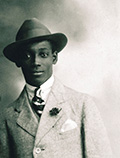
The first translation of a work by a Caribbean author to appear in the German language area was Anton de Kom's Wir Sklaven von Surinam [We Slaves from Suriname]. The translation was done by the Dutch writer and translator Augusta de Wit, who was a member of the Communist Party of the Netherlands. De Kom's book was published in the Netherlands in 1934 with the help of the CPN and first appeared in German translation in Moscow (Verlagsgenossenschaft Ausländischer Arbeiter in der UdSSR). A year later, the translation by Augusta de Wit was also published by the Ring-Verlag in Zurich. De Kom's indictment of racism and oppression, and his plea for a society based on equality, tolerance and solidarity was re-published in the Netherlands in 2020 and became a bestseller. The re-published work was then immediately translated into several languages. The German translation by Birgit Erdman appeared with the publisher Transit in Berlin. De Kom's "Cry for justice" (Brockschmidt, 2021) apparently came at the right time:
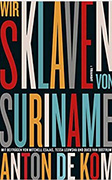
“Thus the book market has now remembered a repressed chapter of Dutch colonial history and unearthed a text that was banned for decades and only distributed in illegal pirated editions: "We Slaves of Suriname" by Anton de Kom, who was born in 1898 as the grandson of black slaves in the Dutch colony on the north-east coast of South America and fought for their freedom as a journalist and political activist. Kom's book is a passionately written work of indictment, a reckoning with the colonial policy of the Netherlands, and gives a damning testimony - morally, human rights-wise, politically and economically.” (Löffler, 2021)
Albert Helman
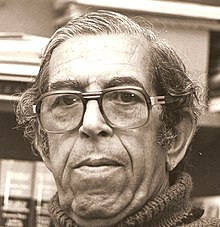
The fact that Albert Helman was born in Paramaribo was probably not the reason for the first translation of his work into German. Like De Kom, Helman actively fought for the rights of the Surinamese, but books like Zuid-Zuid-West [South-South-West] (1926; the first novel by a Surinamese author in Dutch)) and Stille plantage [Quiet Plantation], novels that deal with the matters of exploitation and oppression in Suriname, were not translated into German. On the contrary, the first book by Helman to be translated into German was a Mexican novel: Der Rancho der zehn Mysterien [The Rancho of the Ten Mysteries] (1949), the story of Albert who meets all sorts of mysterious people at Salustiano's ranch, was translated by Irma Silzer. The book was well received:
"It is a lively book, that Imre Reiner knew how to frame with his strong and artistic wood engravings. From beginning to end, Albert Helman captivates us in the wonderful, strange environment of this Rancho of the Ten Mysteries. And envy fills us when we think of how easily people used to be able to travel to the lands of their longing. The very refined translation from Dutch into German was done by Irma Silzer." (C.F., 1950)
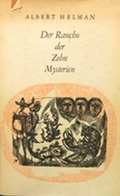
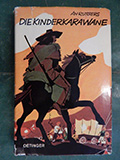
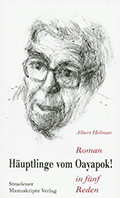
Der Rancho der zehn Mysterien was thus received as an adventure novel, thereby fitting with the translations of Irma Silzer, who had debuted in 1947 with a translation of Jan de Hartog's Holland Glorie. Irma Silzer worked on a great variety of titles that often appeared with Swiss publishers. She translated works by among others Godfried Bomans, A. den Doolaard, Maria Dermoût, Marga Minco and Arthur van Schendel, but adventure novels (Elsing, Fabricius) formed the bulk of her work.
Particularly successful was her translation of a youth novel: Die Kinderkarawane [Children on the Oregon Trail] by An Rutgers van der Loeff-Basenau, which tells the story of the adventures of thirteen-year-old John Sage, who emigrates to North-West America with his siblings. Two more novels by Albert Helman appeared in the German language area in the 1950s: Sturz in den Vulkan [Plummet into the Vulcano] (1953) and Glühende Stille [Smoldering Quietness] (1955), both translated by Irma Silzer, after that it became quiet around Helman in the German language area for a long time. Rather unexpectedly, Albert Helman returned to the spotlight in the 1990s when the translation of his novel in five speeches - Hoofden van de Oyapok! (Häuptlinge von Oayapok!) - was published in the Straelener Manuscripte. At last the topic of Helman's early novels was also being discussed in the German language:
"Hoofden has a unique narrative structure through which the author leads the European readers to define themselves not in opposition to ‘the other’ (civilized against savage), but, instead, to view themselves as both ‘we’ and ‘you’, as both civilized and savage, a perspective that undercuts western ideology." (Van Neck-Yoder, 1988)
Miep Diekmann
The Dutch writer of children's literature and author of stories for young people on realistic and difficult subjects such as slavery, racism and sexual harassment, Miep Diekmann, was born in Assen and only spent a few years of her youth in Curaçao, but for her literary work these years were of great importance. In her books, Miep Diekmann describes Antillean society in all its facets. Her Caribbean or West Indian novels are the forerunners of Antillean youth literature, which would later acquire its own identity with Sonia Garmers and Diana Lebacs.
Talking about her work Diekmann said:
"My thinking has been influenced by my West-Indian upbringing. That is why I want to put the strongly-fed emotion of my upbringing at the centre of my work, while still getting the facts right. Nothing like this has ever previously existed in children's literature. For me, that is the Antillean element in my life. Although it is a rather hypocritical society, because you are not allowed to show what you think those suppressed emotions are much stronger in the Dutch Antilles than in Europe. That has stuck with me." (Rutgers, 1984, p. 7)
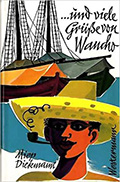
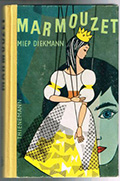
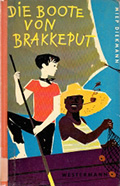
Die Boote von Brakkeput [The Haunted Island] tells of the adventures of Matthijs (Matthias) on the mysterious island of Holle Tong. The book, was well received and, like several other books by Miep Diekmann, nominated for the German Children's Literature Award. "At no point is the adventurous material artificially edited. The moments of suspense arise naturally in a plot that is believable down to the last detail." (Jury, 1960), wrote the Jury of the German Children's Literature Award in its report. Padu ist verrückt, the translation of Padu is gek [Padu is crazy] (1957) appeared in German translation in 1960 and was equally well received. It was reissued four times in the 1960s.
Padu ist verrückt was also nominated for the Deutsche Jugendliteraturpreis, but ultimatly it was ... und viele Grüße von Wancho (1963) that was awarded the prize in 1964, the story of bon vivant Wancho, who, sitting on a case by the harbour, writes letters for people who cannot write themselves. "There is much wisdom worth taking heed of in this cheerful, lively and at the same time thought-provoking book." (Jury, 1964), wrote the jury of the Jugendliteratuurpreis. In 1965 the story was also broadcast as a radio play on the WDR (https://hoerspiele.dra.de/vollinfo.php?tipp=1&dukey=1476299).
The Big Four of Curaçao
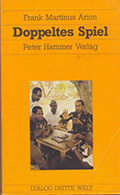
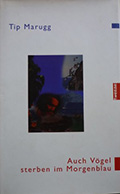
From the beginning of the twentieth century on, Dutch literature from the so-called ABC islands (Aruba, Bonaire and Curacao) flourished.
The 'big four' of the region are Cola Debrot, Boeli van Leeuwen, Tip Marugg and Frank Martinus Arion. Of these four authors only works by Frank Martinus Arion and Tip Marugg were translated into German.
Frank Martinus Arion is probably the best known author from Curaçao. His novel Dubbelspel [Double Play] appeared in 1973 and was translated into German in 1982 under the title Doppeltes Spiel. The book, that was published by Peter Hammer in the book series Dialog Dritte Welt [Dialogue Third World], tells the story of four men and two women who play dominoes. The game gives inspires the characters to reflect on the political and social situation on Curaçao. The story also reflects the spirit of the time around May 1969, when a workers' strike in Curaçao decayed into looting and arson. The workers' uprising is also one of the central themes in Tip Marugg's De morgen loeit weer aan [The Roar of Morning]. His third novel received a lot of attention in the Dutch speaking world because of its nomination for the BookSpot Literature Prize in 1988. It was "the first Antillean novel ever to appear in the Dutch top-ten bestseller list" (Rutgers, 1988). According to the database of the Dutch Foundation for Literature (https://letterenfonds.secure.force.com/vertalingendatabase/), the German translation by Waltraud Hüsmert was published in 1991 (Twenne-Verlag, Berlin), but the book did not receive an appropriate response. In the context of the Frankfurt Book Fair the book was republished in 1993.
"Mixing mysticism and sensuality, the author sets out in search of his own identity. Repeatedly the question is asked whether he, as a white man, really belongs to an island that is almost exclusively inhabited by Black people of color and mestizos." (Dewulf, 2007)
Astrid Roemer
Astrid H. Roemer, born in Suriname, identifies as a 'cosmopolitan writer'. In 1966 she emigrated to the Netherlands, but repeatedly travelled back to Surinam in the first few years. Astrid Roemer made her debut with poems. One of the central themes in her work is Black identity. After 1970, Astrid Roemer produced a fairly large oeuvre consisting of novels, plays and poetry. Astrid Roemer became known to the general public in the Dutch-speaking world with the novel Over de gekte van een vrouw [On the Madness of a Woman] (1982). With this book, she lastingly established her name as a feminist and role model for lesbian women. In 2016, Astrid Roemer was awarded the P.C. Hooft Prize for her "sharp and relevant interventions in the public debate" and her "complex depictions of the history of Suriname" (Fortuin, 2015) and in 2021 she became the first author of Surinamese descent to be awarded the Prize of Dutch Literature.
In Lijken op liefde [Resembling Love] (1997) the Surinamese housekeeper Cora tries to fathom the meaning of her life as a wife in Suriname. The German translation was published in 1998 by Berlin-Verlag Lijken op liefde was awarded the LiBeraturpreis in 1999. (LiBeraturpreis)

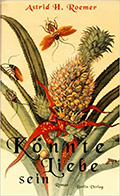
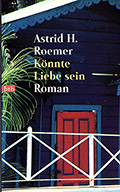
The new generation
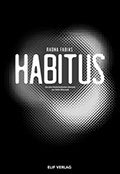
Around 2010, a new generation of authors conquered the market in the Dutch-speaking world. Authors such as Etchica Voorn, Johan Fretz, Gerschwin Bonevacia, Dean Bowen and Roberta Petzold were awarded prizes, performed on high-profile television programmes and presented themselves in newspapers and magazines. These authors are bicultural, but different from their older colleagues. Their work is also determined by topics such as slavery, decolonization and diversity, but the distance is greater. The new generation is geared towards "international literature" and more deeply "rooted" in Dutch culture than before (A new generation of Dutch-Caribbean writers). When it comes to the Caribbean, this happens mainly indirectly, in the form of a recalling of the past, a return to the country of one's parents.
Radna Fabias was born on Curacao and is one of the big stars of the new generation. She received no less than five major prizes for her poetry anthology Habitus (2018).
“Her poems may evoke a tropical island, but they masterfully use irony and cutting stereotypes and ready-mades to address the familiar clichés about the island’s idyllic life and landscape. “Using overwhelming force, she drags the reader into a sweltering in-between space,” (Streekstra, 2021)
The anthology Habitus was published in German translation in 2022 by the publisher of regional and international poetry Elif (Nettetal). The translation of the poems was done by Stefan Wieczorek, who in 2022 presented poems by Ester Naomi Perquin with the same publisher.
Against forgetting
The end? No. Almost
The end? No. But
What do you mean by
No: - salt as well?
Can you hear me: salt as well?
Yes. Salt as well? Yes salt.
(Faverey, 2004, p. 16)
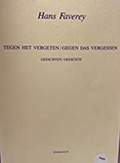
In 1991, an anthology of poems by the poet Hans Faverey, who was born in Suriname (Paramaribo) but grew up in Amsterdam, was published by Kleinheinrich in Münster. The poems were translated by Rosemarie Still, who also translated works by Louis Paul Boon, Hugo Claus, Tessa de Loo, Gerhard Durlacher, Willem Frederik Hermans, Judith Herzberg, Lucebert, Cees Nooteboom and Jan Wolkers. Hans Faverey is considered to be one of the most prominent and influential twentieth-century poets of the Dutch language area. His work has been translated into several languages, but in the German-speaking world no further titles have been published.
The publisher emphatically regrets that no more than 200 copies of Gegen das Vergessen [Against Forgetting] were sold. Although the authors Kleinheinrich presents in their own language area are among the greatest and most important, abroad they unfortunately often lead a "schadowy existence" (Kleinheinrich, 2001). Fortunately, publishers like Kleinheinrich keep on trying despite the difficulties.
(Herbert Van Uffelen)
References
Brockschmidt, Rolf: Es war einmal in Suriname - Neu entdeckter Klassiker aus dem Jahr 1934: Anton de Kom erinnert an Sklavenhalterzeiten in Niederländisch-Guyana. In: Der Tagesspiegel, Issue: 6. sept., (2021).
C.F.: Anton Helman - Der Rancho der zehn Mysterien. In: Rote Revue, Vol.: 29, (1950) - p. 408.
Dewulf, Jeroen: Nachruf auf Tip Marugg (1923-2007). In: Sandammeer, (2007). (http://www.sandammeer.at/portraits/tip_marugg-dewulf.htm)
Een nieuwe generatie Nederlands-Caraïbische schrijvers: 2010-2020. In: Literatuurgeschiedenis, (visited on 8.8.2022). (https://www.literatuurgeschiedenis.org/21e-eeuw/een-nieuwe-generatie-nederlands-caraibische-schrijvers-2010-2020)
Faverey, Hans: Against the forgetting. Trans.: Jones, Francis - 1. ed. - New York : New Directions, (2004) (New Directions Paperback, 969).
Fortuin, Arjan: P.C. Hooftprijs 2016 naar Astrid H. Roemer. In: NRC Handelsblad, Issue: 15. dec., (2015). (https://www.nrc.nl/nieuws/2015/12/15/p-c-hooftprijs-2016-naar-astrid-h-roemer-a1466536)
Jury: Die Boote von Brakkeput. In: Arbeitskreis Jugendliteratur, (1960). (https://www.jugendliteratur.org/buch/die-boote-von-brakkeput-1875)
Jury:..und viele Grüße von Wancho. In: Arbeitskreis Jugendliteratur, (1964). (https://www.jugendliteratur.org/buch/und-viele-gruesse-von-wancho-1816)
Kleinheinrich, Josef: Kommuniqué. In: Buchkunst, (2001). (http://www.kleinheinrich.de/buchkunst/kommunique.html)
Löffler, Sigrid: Systematisches Abgrasen und Ausrauben. In: Falter, Vol.: Nr. 21, Issue: 28. may, (2022) - p. 28.
Rutgers, Wim: De Caraïbische jeugdboeken van Miep Diekmann. Oranjestad; Den Haag : Leopold, (1984).
Rutgers, Wim: De schrijver als ziener - Tip Marugg ‘De morgen loeit weer aan'. In: Ons Erfdeel, Vol.: Jg. 31, (1988) - p. 581.
Streekstra, Feline: Radna Fabias. In: Poetry International, (2021). (https://www.poetryinternational.com/en/poets-poems/poets/poet/102-29583_Fabias)
Van Neck-Yoder, Hilda: Colonialism and the author - Albert Helman's “Hoofden van de Oayapok! In: Oso, Vol.: 7, (1988) - p. 21-30.
